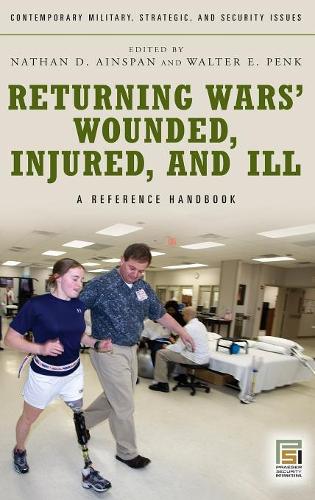
Returning Wars' Wounded, Injured, and Ill: A Reference Handbook
(Hardback)
Publishing Details
Returning Wars' Wounded, Injured, and Ill: A Reference Handbook
By (Author) Nathan D. Ainspan
Edited by Walter E. Penk
Bloomsbury Publishing PLC
Praeger Publishers Inc
30th September 2008
United States
Classifications
Professional and Scholarly
Non Fiction
362.1086970973
Physical Properties
Hardback
284
Description
Thousands of American service members are returning from their tours of duty with physical and/or psychological disabilities. Manyif not mostof these service members will need at least some assistance to adapt to their disabilities and learn how to reintegrate back into civilian life. Also impacted will be the spouse, friends, employers, family members, counselors, and community members of each veteran with a disability. The veterans may not be aware of the ways in which their disabilities are impacting them, nor knowledgeable about the resources available to help them cope. In addition, many such individuals feel isolated and reluctant to acknowledge their difficulties or ask for assistance. The volume compiles and summarizes the information disabled veterans and those with whom they interact will be interested in knowing and using. It describes how disabilities can impact an individual physically, psychologically, and spiritually. It also provides a context of these disabilities to reassure the readers that they are not alone in the thoughts, feelings, and pain, and that others have experienced the same problems and found solutions. The work provides guidance on different forms of treatment that may help the veteran and includes a list of contact information for local VA centers, peer-to-peer counseling services, and other programs, services, and individuals available (frequently for free) for veterans and their families. Brief biographies of disabled veterans and case studies of the ways they reintegrated back into civilian society provide support and perspective. In addition to aiding veterans, the book will serve as a useful reference source for librarians and other information providers.
Reviews
This book offers guidance to those who have returned from military service with physical and/or emotional injuries and disabilities. It is not only for veterans but also for the friends, family members, and professionals who serve and support these brave men and womenPublic libraries will want this book for veterans in their communities, and academic libraries will want it for the growing number of veterans attending their campuses following active duty. This book will also support academic programs in public policy, psychology, counseling, and related fields Recommended. Lower-level undergraduates and above; general readers. * Choice *
should be required reading for any Army Medical Department staff member involved in patient care of wounded warriors, and should also be recommended reading for family members of a wounded warrior. . . . This book has made a valiant attempt to close the gap of uncertainty in how to care for our wounded, while providing a roadmap to better and more meaningful and productive lives for soldiers and their caregivers. * Parameters *
Author Bio
Nathan D. Ainspan is an industrial psychologist in the Washington, DC area. He has researched, written, and worked on improving the situation of employment for people with disabilities and returning service members and veterans with disabilities for number of years. He worked for the Office of Disability Employment Policy at the Department of Labor in Washington, DC and has conducted research, written, and spoken in these areas. His research interests have focused on understanding the symptoms and treatment of PTSD, employment as a form of positive psychology, and the impact and effect of disabilities on the friends, family members, and supporters of veterans and returning service members with disabilities and injuries. Walter E. Penk is Professor of Psychiatry and Behavioral Sciences at Texas A&M College of Medicine and Consultant, Central Texas VA Health Care System. He was Chief of Psychology at the Edith Nourse Rogers VA Hospital in Bedford, Massachusetts and Associate Director of the VISN 1 Mental Illness Research, Education, and Clinical Center (MIRECC) and Director of Psychology for the Department of Mental Health in the Commonwealth of Massachusetts.
